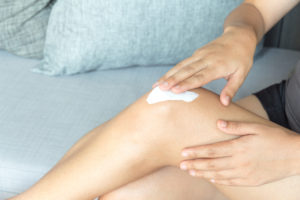A doctor answers 5 questions about dry skin

In the winter months, I wash my hands regularly and use a squirt of hand sanitizer from time to time in an effort to ward off colds. It may be a good health habit, but it also pretty much guarantees that I'm plagued by dry, cracked skin and tiny cuts around my fingers until spring. Dry skin in the winter months is common, partly because people ramp up their hand washing, but the combination of cold air and the lack of humidity also plays a role. Your skin spends the winter months fighting to retain moisture, not to mention fending off other insults from cold-weather staples like scratchy wool clothes and crackling wood fires. How can your skin survive the season? We asked Dr. Barbara Gilchrest, senior lecturer on dermatology, to weigh in with her best tips to help you protect your skin from winter dryness. 1. What's the most common winter skin problem? For most people, it's dry skin and itching, says Dr. Gilchrest. You can blame cold air and low humidity for strip...







